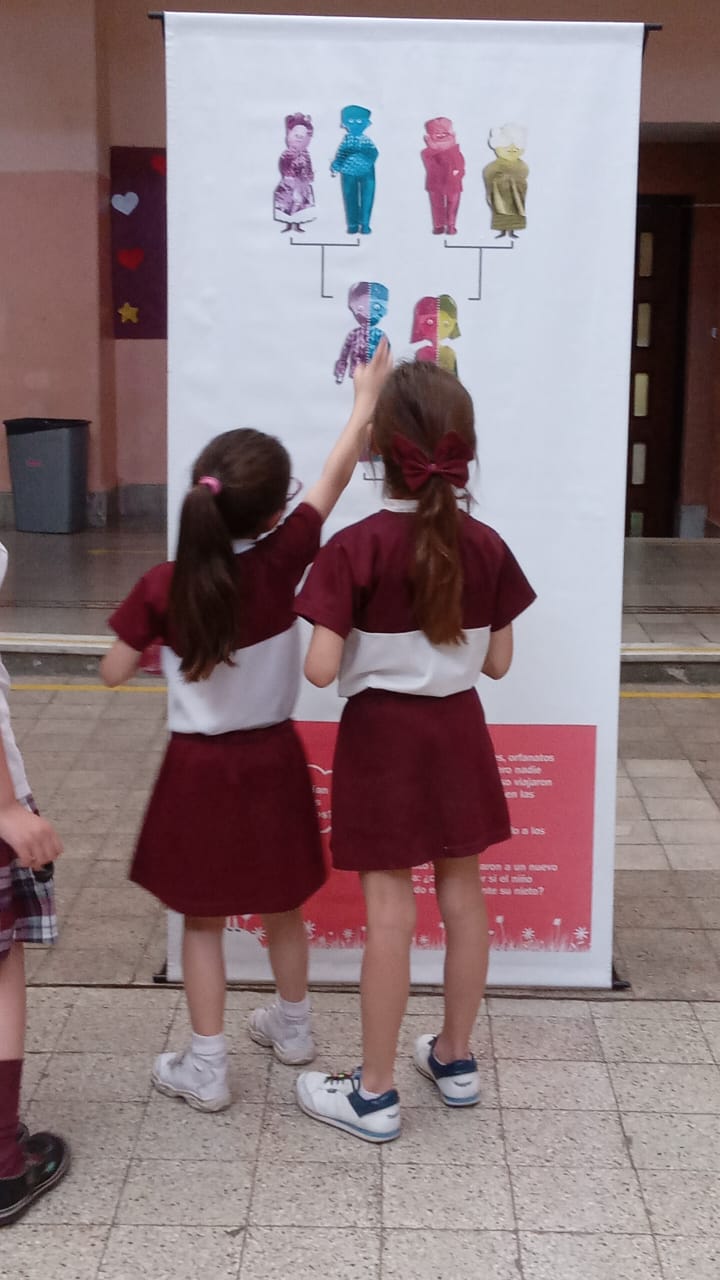The Scientific Legacy of the Grandmothers of Plaza de Mayo: An Interinstitutional and Interdisciplinary Proposal for the Teaching of the Natural Sciences with a Focus on Human Rights inary proposal for the teaching of the natural sciences with a focus on human rights
Main Article Content
Abstract
The work of the Grandmothers of Plaza de Mayo is an emblematic case of a human rights problem, which challenged the scientific community to provide technical answers and contribute to the restitution of identity in appropriated minors. Based on this scientific legacy, an interinstitutional and interdisciplinary extension project was implemented between the university institutions, secondary school and the Plaza de Mayo Grandmothers Association. This meant that the teachers horizontally agreed on activities relating history, biology, chemistry and art with the aim of contextualizing and giving new meaning to scientific practices and in particular the school laboratory. The contributions of this project were: the inclusion of artistic language to contribute to the debate on the construction of science in tension with its historical context. The students, through an evaluative survey, mentioned the need to work on this aspect, prior to natural science activities.
Article Details

This work is licensed under a Creative Commons Attribution-NonCommercial-ShareAlike 4.0 International License.
Aquellos autores/as que tengan publicaciones con esta revista, aceptan los términos siguientes:- Los autores/as conservarán sus derechos de autor y garantizarán a la revista el derecho de primera publicación de su obra, el cuál estará simultáneamente sujeto a la Licencia de reconocimiento de Creative Commons que no se permite un uso comercial de la obra original ni de las posibles obras derivadas, la distribución de las cuales se debe hacer con una licencia igual a la que regula la obra original.
- Los autores/as podrán adoptar otros acuerdos de licencia no exclusiva de distribución de la versión de la obra publicada (p. ej.: depositarla en un archivo telemático institucional o publicarla en un volumen monográfico) siempre que se indique la publicación inicial en esta revista.
- Se recomienda a los autores/as difundir su obra a través de Internet (p. ej.: en archivos telemáticos institucionales o en su página web) después del proceso de publicación, lo cual puede producir intercambios interesantes y aumentar las citas de la obra publicada. (Véase El efecto del acceso abierto).
How to Cite
References
Abuelas de Plaza de Mayo. (1 de julio de 2024). Educación e investigación. https://www.abuelas.org.ar/educacion-e-investigacion
Adúriz-Bravo, A. (2005). ¿Qué naturaleza de la ciencia hemos de saber los profesores de ciencias? Una cuestión actual de la investigación didáctica. Tecné, Episteme y Didaxis, Número extraordinario (2º Congreso sobre Formación de Profesores de Ciencias), 23-33. https://skat.ihmc.us/rid=1P1DPKVRP-2B5S59Q-2DQ0/U1%20AdurizBravo.pdf
Álvarez-Gayou, J.L. (2003). Cómo hacer investigación cualitativa: Fundamentos y metodología. Paidós.
Astudillo, C.S. y Rivarosa A. (2012). Un papel para la epistemología en la enseñanza de las ciencias. Ciencia escolar: enseñanza y modelización, 2(2), 11-34.
Bermudez, G.M.A. García, L.P. y Cisnero, K.G. (2020). Didáctica de las ciencias para una ciudadanía crítica. Reflexiones y prácticas contextualizadas para problemáticas de ambiente y salud. Ensaio Pesquisa em Educação em Ciências, 22. https://doi.org/10.1590/21172020210132
Capella, V.B. (2019). Educar en derechos humanos: Orientaciones del derecho internacional e implementación en la educación superior. Revista de educación y derecho, (20). https://doi.org/10.1344/REYD2019.20.30022
Cámara, A., Lucchese, M., Novella, M. L., Fernandez, A.R., Benítez, M.S. y Theiler, G.R. (2014). Articulación Educativa entre la Universidad y la Secundaria abordada desde la Virología. ExT: Revista de Extensión de la UNC, (5), 13-13.
Di Matteo, F., Kalaidjian, G. y Ohanian, M. (2012). La enseñanza de genocidios y Derechos Humanos en escuelas secundarias de la capital federal de Argentina. El lugar de la escuela en el desarrollo de una conciencia cívica crítica. Actas del IV Coloquio Interamericano sobre educación en Derechos Humanos.
Fals Borda, O. (2010). Situación Contemporánea de la IAP y vertientes afines. En: Herrera Farfán y López Guzmán (Comps.), Ciencia, Compromiso y Cambio Social. Textos de Orlando Fals Borda, (pp. 295-300). Lanzas y Letras-El Colectivo.
Gardner, H. (1998). Inteligencias Múltiples. Barcelona: Paidós.
GPC, Gobierno de la Provincia de Córdoba. Ministerio de Educación. Subsecretaría de Estado de Promoción de Igualdad y Calidad Educativa (2013). Los Transversales como dispositivos de articulación de aprendizajes en la escuela obligatoria y modalidades. Córdoba, Argentina: Autor. Disponible: https://www.igualdadycalidadcba.gov.ar/SIPEC-CBA/publicaciones/Presentaciones/TRANSVERSALES-final.pdf
Hadorn, G. H., Hoffmann-Riem, H., Biber-Klemm, S., Grossenbacher-Mansuy, W., Joye, D., Pohl, C., ... y Zemp, E. (Eds.). (2008). Handbook of transdisciplinary research (Vol. 10, pp. 978-1). Springer.
Hasbún, S.D.L. y Vásquez, H.G.C. (2021). Investigación Acción Participativa: vinculación con la epistemología del sujeto conocido, desarrollo histórico y análisis de sus componentes. Espacio Abierto, 30(3), 145-168. https://www.redalyc.org/journal/122/12268654007/12268654007.pdf
Kolstrein, A.M. (2015). Educación en Derechos Humanos y Educación Superior: una perspectiva controversial. Reencuentro. Análisis de problemas universitarios, (70), 47-69.
Marco, B., Ibáñez, T. y Albero, A. (2000) Diseño de actividades para la alfabetización científica. Aplicaciones a la Educación Secundaria. Apuntes IEPS. Narcea.
Mc Keon, R. y Elena, L. (2014). El discurso de los derechos humanos y sus condiciones de posibilidad en la escuela secundaria. Sinéctica, (42), 1-14.
Prieto, J.H.H. (2020). Determinación y propuesta de una investigación acción participativa en el Colegio Enrique Olaya Herrera. Revista Cedotic, 5(1), 98-119.
Quilez Pardo, J. (2016). ¿Es el profesor de Química también profesor de lengua? Educación Química, 27 (2), 105-114.
Rivarosa, A.S. y Astudillo, C.S. (2013). Las prácticas científicas y la cultura: una reflexión necesaria para un educador de ciencias. Revista iberoamericana de ciencia tecnología y sociedad, 8(23), 45-66.
Salas, J. (2015, 13 de septiembre). La ciencia de las Abuelas. El País. Disponible en: https://elpais.com/elpais/2015/09/04/ciencia/1441363331_846341.html
Sampieri, R., Fernández, C. y Baptista, P. (2006). Metodología de la investigación. (Cuarta Edición). Graw-Hill.
Sandín, M. P. (2003). Investigación cualitativa en Educadon: Fundamentos y tradidones. McGraw-Hill/lnteramericana.
Sanmartí, N. (2010). Enseñar a leer (y a escribir y hablar) desde todas las áreas. Disponible en: https://www.youtube.com/watch?v=vRiqHaBDWVk&list=PLB49BF88839294071
Wulff, G. (2009). Las Abuelas y la genética: el aporte de la ciencia en la búsqueda de los chicos desaparecidos. Abuelas de Plaza de Mayo. Disponible en: https://abuelas.org.ar/register/public/1685556674316-762925688.pdf

